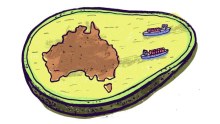RSPCA urges residents to help keep native animals safe after spike in hospital admissions
Updated
 Photo:
Dr Tim Portas works around the clock to help injured native animals. (ABC Radio Brisbane: Terri Begley)
Photo:
Dr Tim Portas works around the clock to help injured native animals. (ABC Radio Brisbane: Terri Begley)
A native animal hospital in south-east Queensland says it is having to treat more than double the number of animals it was four years ago.
RSPCA Queensland said 21,723 native animals had been treated this year compared to 8,500 in 2013.
In response the Wildlife Hospital at Wacol, west of Brisbane, changed its nine-to-five opening hours to now offer around-the-clock care to keep up with demand.
"Human-derived activities and increased urbanisation means that the habitat for these animals is disappearing and they don't have anywhere to go," Dr Tim Portas said.
"We can see more than 100 patients a day including the animals we already have hospitalised.
"Each animal can take a considerable amount of time to treat and there's a tremendous amount of resources needed to deal with the animals."
Residents must take responsibility
Dr Portas said animals that had been hit by cars were a common sight.
Other animals are being affected by general day-to-day actions of residents.
How to live with wildlife - ABC
Animals- desex your cat
- confine domestic dogs and cats and register them
Backyard
- plant natives
- do not feed wildlife
- do not use rat sack, snail bait or other poisons
Car
- drive safely
- take action when you see an injured animal
Source: RSPCA
"Turtles, water fouls and birds ingest discarded hooks and fishing lines," Dr Portas said.
"Dog attacks is another big one with many owners not keeping their dogs inside at night.
"We're seeing koalas and possums really affected by domestic animals with some really serious injuries."
Stress caused by displacement due to urbanisation is causing skin infections on much of the local possum population, according to Dr Portas.
Ratsak and domestic poisons used by residents was also an issue.
"We need to think about what we're putting out; many brushtail possums we treat have eaten these poisons," he said.
"They are brought in bleeding and they need blood transfusions but sometimes they're too far gone."
Rehabilitation and recovery
When an animal arrives at the hospital they are triaged, stabilised and then placed in recovery before they are given to wildlife carers for rehabilitation.
Dr Portas said over the warmer months, certain weather events would see an increase of admissions to the hospital.
"We also start to see baby birds and possums coming in," he said.
"Sometimes we get animals that are kidnapped, like turtles and echidnas.
"They could be found wandering on the road and people bring them in but sometimes they don't have anything wrong with them."
If you do discover an injured animal, call the RSPCA 1300 ANIMAL (1300 264 625) emergency line or contact your local vet.
Topics: animals, urban-development-and-planning, environment, community-and-society, brisbane-4000, wacol-4076
First posted











